#Crypto Banking Software
Text
Unlock The Potential Of Crypto Banking Software
In the rapidly evolving landscape of financial technology, cryptocurrency has emerged as a powerful force. Traditional banking systems, while robust, are increasingly being challenged by the decentralized nature of cryptocurrencies. As a result, the concept of a White Label Crypto Banking Platform has gained traction, offering businesses an opportunity to enter the crypto banking space without the complexities of developing a platform from scratch. This article explores the potential of these platforms and why they are becoming a cornerstone in the digital banking revolution.
The Rise of Crypto Banking
Cryptocurrency has shifted from a niche market to a mainstream financial instrument. As individuals and businesses alike recognize the benefits of decentralized finance (DeFi), the demand for crypto banking services has surged. These services allow users to store, transfer, and invest in cryptocurrencies, much like traditional banking systems but with the added advantages of blockchain technology—such as security, transparency, and lower transaction costs.
However, developing a crypto banking platform is not without its challenges. The complexities of blockchain technology, regulatory compliance, and the need for robust security measures can be daunting for businesses looking to venture into this space. This is where White Label Crypto Banking Platforms come into play.
What is a White Label Crypto Bank?
A White Label Crypto Bank is a pre-built, customizable solution that businesses can rebrand and offer to their customers as their own. It eliminates the need for extensive development and allows businesses to launch a crypto-banking service quickly and efficiently. These platforms typically come with a suite of features, including wallet management, cryptocurrency exchange, payment processing, and compliance tools, all integrated into one cohesive system.
The concept of white labeling is not new. It has been used across various industries, including traditional banking, where white-label solutions have enabled smaller institutions to offer services akin to those of larger banks. In the context of crypto banking, white-label platforms provide a significant advantage by reducing the time, cost, and technical expertise required to enter the market.
Benefits of Using a White Label Crypto Banking Platform
Speed to Market
One of the most significant advantages of using a white label solution is the speed at which a business can launch its crypto-banking services. Building a crypto banking platform from scratch can take years of development and testing. A white label solution, on the other hand, is ready to deploy, allowing businesses to enter the market in a matter of weeks or months.
Cost-Effective
Developing a crypto banking platform involves substantial financial investment in technology, development, and security. By opting for a white label solution, businesses can significantly reduce these costs. The platform provider absorbs the development and maintenance expenses, allowing businesses to focus on marketing and customer acquisition.
Customization and Branding
Although these platforms are pre-built, they offer a high degree of customization. Businesses can tailor the platform to meet their specific needs, whether that involves integrating additional features or modifying the user interface to align with their brand identity. This flexibility ensures that the final product reflects the company’s branding and values.
Regulatory Compliance
Navigating the regulatory landscape of cryptocurrency can be challenging, especially for new entrants. White label crypto banking platforms often come with built-in compliance features that help businesses adhere to local and international regulations. This includes anti-money laundering (AML) protocols, know-your-customer (KYC) procedures, and data protection measures, ensuring that the platform operates within legal boundaries.
Scalability
As the demand for crypto banking services grows, so does the need for a platform that can scale accordingly. White label platforms are designed to handle increased user activity and transaction volumes, making them ideal for businesses with ambitious growth plans. This scalability ensures that the platform can accommodate future expansions without significant overhauls.
Security
Security is paramount in the world of cryptocurrencies. White label crypto banking platforms are built with robust security features, including multi-signature wallets, encryption, and two-factor authentication. These measures protect against hacking and fraud, providing users with peace of mind and enhancing the platform's reputation.
The Future of White Label Crypto Banking
The potential of white label crypto banking platforms is immense. As cryptocurrencies continue to gain acceptance and adoption worldwide, the demand for crypto banking services will only increase. White label solutions offer a viable entry point for businesses looking to capitalize on this trend without the burden of development and compliance challenges.
Moreover, the flexibility of these platforms allows businesses to innovate and offer unique services that cater to their target market. Whether it's integrating DeFi services, offering crypto-backed loans, or enabling seamless fiat-to-crypto conversions, white label platforms provide the foundation for a wide range of financial products and services.
Additionally, as the regulatory environment around cryptocurrencies becomes more defined, white label platforms will continue to evolve, incorporating the latest compliance features and adapting to new regulations. This adaptability ensures that businesses using these platforms can remain compliant and competitive in a dynamic market.
Conclusion
The rise of cryptocurrencies has ushered in a new era of financial services, and white label crypto banking platforms are at the forefront of this transformation. By offering a quick, cost-effective, and customizable solution, these platforms empower businesses to enter the crypto banking space with minimal hassle. As the demand for crypto banking services grows, so too will the opportunities for businesses to leverage white label solutions to unlock new revenue streams and expand their offerings.In a world where digital assets are becoming increasingly integral to the global economy, embracing a white label crypto bank could be the key to staying ahead of the curve. With the right platform, businesses can not only meet the current demands of the market but also position themselves as leaders in the future of finance. Whether you are a fintech startup or an established financial institution, a white label solution provides the tools and infrastructure needed to thrive in the evolving crypto landscape.
0 notes
Text
Europe’s Digital Bank N26 Has Good News For Crypto Traders - Get Insights
European digital bank N26 has announced its decision to offer cryptocurrency trading. The feature is first getting launched in Austria where customers will be able to trade in as many as 100 cryptocurrencies.
The Berlin-headquartered central bank, backed by Peter Thiel, plans to expand the service, called N26 Crypto, to other countries within the next six months. Soon, as many as 196 tokens will be offered to the customers.
The feature is powered by the Austrian crypto and stock trading app Bitpanda’s White Label product. Currently, N26 is charging a transaction fee of 1.5% on Bitcoin and a 2.5% fee on all the other cryptocurrencies.
The $9 billion European digital bank does not have local offices and works only online. Despite its high valuation, the bank has had a difficult few years, failing to penetrate the UK and U.S. markets and having to spend more on tightening anti-money laundering (AML) measures under regulatory pressure.

Is N26 late to the party?
Major fintech groups such as PayPal and Revolut have already been offering crypto assets to their customers. N26 entered the cryptocurrency market rather late.
“We believe that cryptocurrencies are going to continue to be a prominent part of the financial ecosystem,” Gilles BianRosa, Chief Product Officer, N26 said. He added that N26 users are extremely interested in cryptocurrency. The interest remains super high, even in a bear market.
This year, Bitcoin and other tokens have witnessed significant losses as investors exited the market owing to concerns about rising interest rates and liquidity shortages.
While traditional banking institutions have avoided cryptocurrency owing to worries about its high volatility and participation in the fraud, N26, which holds a European Union banking license, is putting its toes into the field, believing that it is becoming more popular.
Source: AMB CRYPTO
How can you start your own Crypto Bank?
Are you a start-up planning to launch a crypto bank?
Effectively kick-start your venture with Crypto Banking Solutions from Assetfinx. We provide a white-label digital asset banking solution that quickens deployment and enables you to jump into the digital asset market quickly.
Our white label FinTech platform is filled up with all essential banking features – such as bank accounts, KYC, Intuitive front-end, Secure API, payments, lending, borrowing, trading, credit/debit cards, and user onboarding.
Get Consultation
Phone/ Whatsapp: 638 430 1100
Mail: [email protected]
#crypto#Cryptocurrency#Crypto banking software#crypto banking#crypto banking solutions#whitelabel crypto banking
0 notes
Text
Do you look to buy a verified Binance account? Look no further! Our Binance account verification service ensures that your account is fully verified and ready to use. With our quick and easy verification process, you can start trading on Binance in no time.
Our team of experts ensures that your account is fully verified, including identity verification, address verification, and more. We use the latest security protocols to keep your information safe and secure. Plus, with our affordable prices and 24/7 customer support, you can trust us to provide you with the best service possible.
So why wait? Buy your verified Binance account today and start trading on one of the world’s most popular cryptocurrency exchanges!

0 notes
Text
Streamlining Payments to International Contractors: Best Practices - Technology Org
New Post has been published on https://thedigitalinsider.com/streamlining-payments-to-international-contractors-best-practices-technology-org/
Streamlining Payments to International Contractors: Best Practices - Technology Org
Whenever you’re working with international contractors, managing payments outgoing abroad will be a crucial part of your operations — which is often more troublesome than it sounds using traditional methods. What are the best practices for businesses looking to optimize their international payment process?
Business – artistic interpretation.
The Challenges of International Payments
Let’s first try to understand the challenges of international payments. You’ll have to take into consideration factors such as currency exchange rates, transaction fees, payment delays, compliance with local tax laws and regulations, etc. — all of which can complicate the process. Instead of manually handling these, companies opt for efficient and cost-effective software solutions to pay international contractors.
The diversity in banking systems and digital payment infrastructures between countries doesn’t help, adding yet another complexity layer to the process.
Compliance with local tax laws and regulations is non-negotiable. This includes understanding withholding tax requirements, reporting obligations, and any legal constraints specific to the contractor’s country. Non-compliance can result in fines and damage to reputation.
Selecting a payment platform that caters specifically to international transactions is crucial. Look for platforms that offer competitive exchange rates, low transaction fees, and powerful security features. Additionally, platforms that can integrate with your existing financial systems will help streamline the process further.
Best Practices for Streamlining International Payments
Offer Multiple Payment Options — Flexibility is key when dealing with international contractors. Providing multiple payment options, including bank transfers, digital wallets, and international wire transfers, is necessary to allow contractors to choose the most convenient and cost-effective method.
Automate and Integrate Payments — Automation reduces the risk of errors and saves time. Integrating payment systems with your accounting software also allows for real-time tracking of transactions and better financial management.
Negotiate Clear Payment Terms — Clearly defined payment terms, including currency, payment schedule, and any fees, should be agreed upon in advance. This transparency helps in building trust and avoiding misunderstandings.
Consider Currency Fluctuations — Currency exchange rates can significantly impact the cost of payments. Businesses should monitor currency trends and consider tools like forward contracts to lock in exchange rates.
Prioritize Security and Privacy — Making sure the security and privacy of transactions is critical. Implement powerful cybersecurity measures and adhere to international data protection regulations.
Regular Review — The international financial landscape is dynamic. Regularly reviewing and updating your payment processes ensures they remain efficient and compliant with the latest regulations and technologies.
In summary
Efficiently managing payments to international contractors is a balancing act between compliance and cost-effectiveness. Above, we’ve covered some of the best industry practices — adopt them to streamline your international payment processes and keep your transactions timely, fostering good relationships with your clients.
Want to know more about the future of international payments? Check out this article on Crypto Payment Gateway Solutions!
#accounting#accounting software#Article#automation#banking#Building#Business#Companies#compliance#crypto#cybersecurity#data#data protection#diversity#Features#financial#fintech#Fintech news#Future#Industry#it#Landscape#Legal#management#Method#monitor#online payments#Other posts#privacy#process
0 notes
Text
#kyc canada#kyc providers#kyc solution#kyc api#kyc software#fintech#kyc platform#healthcare#insurance#kyc verification#KYC Solutions for Canada#business#finance#banks#blockchain#crypto
1 note
·
View note
Text
White Label Crypto Banking Software
#White Label Crypto Bank#Crypto Banking Software Solutions#White Label Crypto Banking Software#White Label Crypto Banking Software Solutions#Crypto Banking Software Services#Crypto Banking Software Development
1 note
·
View note
Text
#bankingfrontiers#banking#finance#technology#hdfc bank#uidai#business news in hindi#indian economy#axis bank#rbi#infosys#reserve bank of india#software#innovation#investment#organization#crypto#blockchain#bitcoin latest news#crypto latest news
0 notes
Text
The long sleep of capitalism’s watchdogs

There are only five more days left in my Kickstarter for the audiobook of The Bezzle, the sequel to Red Team Blues, narrated by @wilwheaton! You can pre-order the audiobook and ebook, DRM free, as well as the hardcover, signed or unsigned. There's also bundles with Red Team Blues in ebook, audio or paperback.

One of the weirdest aspect of end-stage capitalism is the collapse of auditing, the lynchpin of investing. Auditors – independent professionals who sign off on a company's finances – are the only way that investors can be sure they're not handing their money over to failing businesses run by crooks.
It's just not feasible for investors to talk to supply-chain partners and retailers and verify that a company's orders and costs are real. Investors can't walk into a company's bank and demand to see their account histories. Auditors – who are paid by companies, but work for themselves – are how investors avoid shoveling money into Ponzi-pits.
Attentive readers will have noticed that there is an intrinsic tension in an arrangement where someone is paid by a company to certify its honesty. The company gets to decide who its auditors are, and those auditors are dependent on the company for future business. To manage this conflict of interest, auditors swear fealty to a professional code of ethics, and are themselves overseen by professional boards with the power to issue fines and ban cheaters.
Enter monopolization. Over the past 40 years, the US government conducted a failed experiment in allowing companies to form monopolies on the theory that these would be "efficient." From Boeing to Facebook, Cigna to InBev, Warner to Microsoft, it has been a catastrophe. The American corporate landscape is dominated by vast, crumbling, ghastly companies whose bad products and worse corporate conduct are locked in a race to see who can attain the most depraved enshittification quickest.
The accounting profession is no exception. A decades-long incestuous orgy of mergers and acquisitions yielded up an accounting sector dominated by just four firms: EY, KPMG, PWC and Deloitte (the last holdout from the alphabetsoupification of corporate identity). Virtually every major company relies on one of these companies for auditing, but that's only a small part of corporate America's relationship with these tottering behemoths. The real action comes from "consulting."
Each of the Big Four accounting firms is also a corporate consultancy. Some of those consulting services are the normal work of corporate consultants – cookie cutter advice to fire workers and reduce product quality, as well as supplying dangerously defecting enterprise software. But you can get that from the overpaid enablers at McKinsey or BCG. The advantage of contracting with a Big Four accounting firm for consulting is that they can help you commit finance fraud.
Remember: if you're an executive greenlighting fraud, you mostly just want to be sure it's not discovered until after you've pocketed your bonus and moved on. After all, the pro-monopoly experiment was also an experiment in tolerating corporate crime. Executives who cheat their investors, workers and suppliers typically generate fines for their companies, while escaping any personal liability.
By buying your cheating advice from the same company that is paid to certify that you're not cheating, you greatly improve your chances of avoiding detection until you've blown town.
Which brings me to the idea of the "bezzle." This is John Kenneth Galbraith's term for "the weeks, months, or years that elapse between the commission of the crime and its discovery." This is the period in which both the criminal and the victim feel like they're better off. The crook has the victim's money, and the victim doesn't know it. The Bezzle is that interval when you're still assuming that FTX isn't lying to you about the crazy returns they're generating for your crypto. It's the period between you getting the shrinkwrapped box with a 90% discounted PS5 in it from a guy in an alley, and getting home and discovering that it's full of bricks and styrofoam.
Big Accounting is a factory for producing bezzles at scale. The game is rigged, and they are the riggers. When banks fail and need a public bailout, chances are those banks were recently certified as healthy by one of the Big Four, whose audited bank financials failed 800 re-audits between 2009-17:
https://pluralistic.net/2020/09/28/cyberwar-tactics/#aligned-incentives
The Big Four dispute this, of course. They claim to be models of probity, adhering to the strictest possible ethical standards. This would be a lot easier to believe if KPMG hadn't been caught bribing its regulators to help its staff cheat on ethics exams:
https://www.nysscpa.org/news/publications/the-trusted-professional/article/sec-probe-finds-kpmg-auditors-cheating-on-training-exams-061819
Likewise, it would be easier to believe if their consulting arms didn't keep getting caught advising their clients on how to cheat their auditing arms:
https://pluralistic.net/2023/05/09/dingo-babysitter/#maybe-the-dingos-ate-your-nan
Big Accounting is a very weird phenomenon, even by the standards of End-Stage Capitalism. It's an organized system of millionaire-on-billionaire violence, a rare instance of the very richest people getting scammed the hardest:
https://pluralistic.net/2021/06/04/aaronsw/#crooked-ref
The collapse of accounting is such an ominous and fractally weird phenomenon, it inspired me to write a series of hard-boiled forensic accountancy novels about a two-fisted auditor named Martin Hench, starting with last year's Red Team Blues (out in paperback next week!):
https://us.macmillan.com/books/9781250865854/redteamblues
The sequel to Red Team Blues is called (what else?) The Bezzle, and part of its ice-cold revenge plot involves a disillusioned EY auditor who can't bear to be part of the scam any longer:
https://www.kickstarter.com/projects/doctorow/the-bezzle-a-martin-hench-audiobook-amazon-wont-sell
The Hench stories span a 40-year period, and are a chronicle of decades of corporate decay. Accountancy is the perfect lens for understanding our modern fraud economy. After all, it was crooked accountants who gave us the S&L crisis:
https://scholarworks.umt.edu/cgi/viewcontent.cgi?article=10130&context=etd
Crooked auditors were at the center of the Great Financial Crisis, too:
https://francinemckenna.com/2009/12/07/they-werent-there-auditors-and-the-financial-crisis/
And of course, crooked auditors were behind the Enron fraud, a rare instance in which a fraud triggered a serious attempt to prevent future crimes, including the destruction of accounting giant Arthur Andersen. After Enron, Congress passed Sarbanes-Oxley (SOX), which created a new oversight board called the Public Company Accounting Oversight Board (PCAOB).
The PCAOB is a watchdog for watchdogs, charged with auditing the auditors and punishing the incompetent and corrupt among them. Writing for The American Prospect and the Revolving Door Project, Timi Iwayemi describes the long-running failure of the PCAOB to do its job:
https://prospect.org/power/2024-01-26-corporate-self-oversight/
For example: from 2003-2019, the PCAOB undertook only 18 enforcement cases – even though the PCAOB also detected more than 800 "seriously defective audits" by the Big Four. And those 18 cases were purely ornamental: the PCAOB issued a mere $6.5m in fines for all 18, even though they could have fined the accounting companies $1.6 billion:
https://www.pogo.org/investigations/how-an-agency-youve-never-heard-of-is-leaving-the-economy-at-risk
Few people are better on this subject than the investigative journalist Francine McKenna, who has just co-authored a major paper on the PCAOB:
https://papers.ssrn.com/sol3/papers.cfm?abstract_id=4227295
The paper uses a new data set – documents disclosed in a 2019 criminal trial – to identify the structural forces that cause the PCAOB to be such a weak watchdog whose employees didn't merely fail to do their jobs, but actually criminally abetted the misdeeds of the companies they were supposed to be keeping honest.
They put the blame – indirectly – on the SEC. The PCAOB has three missions: protecting investors, keeping markets running smoothly, and ensuring that businesses can raise capital. These missions come into conflict. For example, declaring one of the Big Four auditors ineligible would throw markets into chaos, removing a quarter of the auditing capacity that all public firms rely on. The Big Four are the auditors for 99.7% of the S&P 500, and certify the books for the majority of all listed companies:
https://blog.auditanalytics.com/audit-fee-trends-of-sp-500/
For the first two decades of the PCAOB's existence, the SEC insisted that conflicts be resolved in ways that let the auditing firms commit fraud, because the alternative would be bad for the market.
So: rather than cultivating an adversarial relationship to the Big Four, the PCAOB effectively merged with them. Two of its board seats are reserved for accountants, and those two seats have been occupied by Big Four veterans almost without exception:
https://www.pogo.org/investigations/captured-financial-regulator-at-risk
It was no better on the SEC side. The Office of the Chief Accountant is the SEC's overseer for the PCAOB, and it, too, has operated with a revolving door between the Big Four and their watchdog (indeed, the Chief Accountant is the watchdog for the watchdog for the watchdogs!). Meanwhile, staffers from the Office of the Chief Accountant routinely rotated out of government service and into the Big Four.
This corrupt arrangement reached a crescendo in 2019, with the appointment of William Duhnke – formerly of Senator Richard Shelby's [R-AL] staff – took over as Chief Accountant. Under Duhnke's leadership, the already-toothless watchdog was first neutered, then euthanized. Duhnke fired all four heads of the PCAOB's main division and then left their seats vacant for 18 months. He slashed the agency's budget, "weakened inspection requirements and auditor independence policies, and disregarded obligations to hold Board meetings and publicize its agenda."
All that ended in 2021, when SEC chair Gary Gensler fired Duhnke and replaced him with Erica Williams, at the insistence of Bernie Sanders and Elizabeth Warren. Within a year, Williams had issued 42 enforcement actions, the largest number since 2017, levying over $11m in sanctions:
https://www.dlapiper.com/en/insights/publications/2023/01/pcaob-sets-aggressive-agenda-for-2023-what-to-expect-as-agency-enforcement-expands
She was just getting warmed up: last year, PCAOB collected $20m in fines, with five cases seeing fines in excess of $2m each, a record:
https://www.dlapiper.com/en/insights/publications/2024/01/pcaobs-enforcement-and-standard-setting-rev-up-what-to-expect-in-2024
Williams isn't shy about condemning the Big Four, publicly sounding the alarm that 40% of the 2022 audits the PCAOB reviewed were deficient, up from 34% in 2021 and 29% in 2020:
https://www.wsj.com/articles/we-audit-the-auditors-and-we-found-trouble-accountability-capital-markets-c5587f05
Under Williams, the PCAOB has enacted new, muscular rules on lead auditors' duties, and they're now consulting on a rule that will make audit inspections much faster, shortening the documentation period from 45 days to 14:
https://tax.thomsonreuters.com/news/pcaob-rulemaking-could-lead-to-more-timely-issuance-of-audit-inspection-reports/
Williams is no fire-breathing leftist. She's an alum of the SEC and a BigLaw firm, creating modest, obvious technical improvements to a key system that capitalism requires for its orderly functioning. Moreover, she is competent, able to craft regulations that are effective and enforceable. This has been a motif within the Biden administration:
https://pluralistic.net/2022/10/18/administrative-competence/#i-know-stuff
But though these improvements are decidedly moderate, they are grounded in a truly radical break from business-as-usual in the age of monopoly auditors. It's a transition from self-regulation to regulation. As @40_Years on Twitter so aptly put it: "Self regulation is to regulation as self-importance is to importance":
https://twitter.com/40_Years/status/1750025605465178260

Berliners: Otherland has added a second date (Jan 28 - THIS SUNDAY!) for my book-talk after the first one sold out - book now!

If you'd like an essay-formatted version of this post to read or share, here's a link to it on pluralistic.net, my surveillance-free, ad-free, tracker-free blog:
https://pluralistic.net/2024/01/26/noclar-war/#millionaire-on-billionaire-violence


Back the Kickstarter for the audiobook of The Bezzle here!

Image:
Sam Valadi (modified)
https://www.flickr.com/photos/132084522@N05/17086570218/
Disco Dan (modified)
https://www.flickr.com/photos/danhogbenspics/8318883471/
CC BY 2.0:
https://creativecommons.org/licenses/by/2.0/
#pluralistic#big accounting#auditing#marty hench#martin hench#big four accountants#management consultants#corruption#millionaire on billionaire violence#long cons#the bezzle#conflicts of interest#revolving door#self-regulation#gaap#sox#sarbanes-oxley#too big to fail#too big to jail#audits#defective audits#Public Company Accounting Oversight Board#pcaob#sec#scholarship#Francine McKenna#William Duhnke#administrative competence#photocopier kickers#NOCLARs
67 notes
·
View notes
Text
2024 team sponsors recap!
this is completely irrelevant to F1 but i study and do these stuffs for a living sooo 😩😩 2023 sponsors are based on the sponsors that are there at the beginning of the season (new sponsors that join in the middle of the season will be classified as 2024's)
Mercedes AMG Petronas F1 Team:
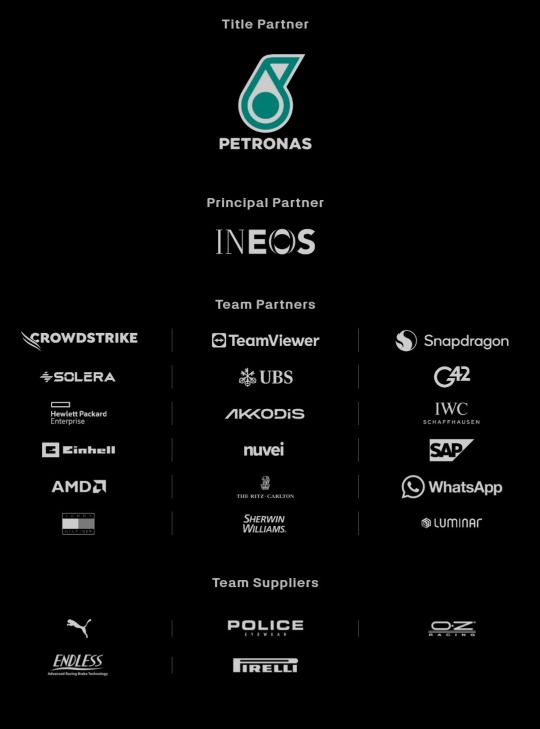
New sponsors: Whatsapp, Luminar (American tech company), SAP (German software company), nuvei (Canadian credit card services), Sherwin Williams (American painting company) 2024 data last update: 2024/02/14
Old sponsors that left: Monster Energy, Pure Storage (American technology company), fastly (American cloud computing services), Axalta (American painting company), Eight sleep (American mattresses company) 2023 data last update: 2023/01/07
Oracle Red Bull Racing F1 Team:
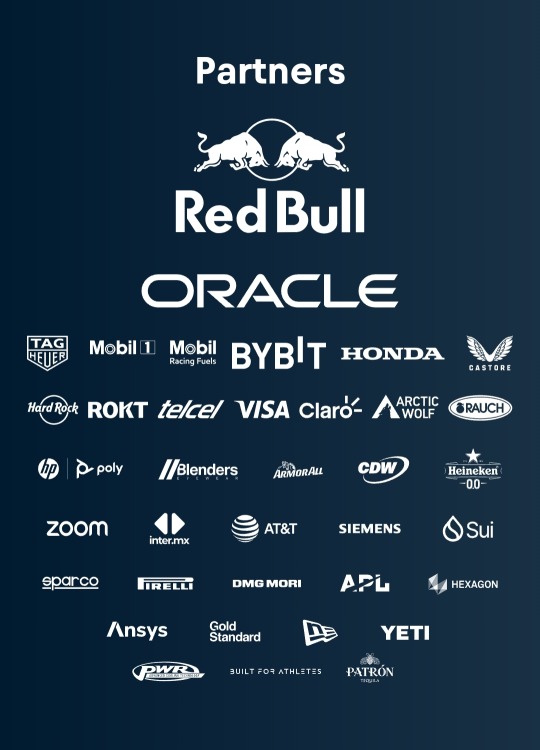
New sponsors: Yeti (American cooler manufacturer, joined later in 2023), APL (American footwear/athletic apparel manufacturer, joined later in 2023), CDW (American IT company, joined later in 2023), Sui (American tech app by Mysten Labs, joined later in 2023), Patron Tequila (Mexican alcoholic beverages company, joined later in 2023) 2024 data last update: 2024/02/15
Old sponsors that left: CashApp, Walmart, Therabody (American wellness technology company), Ocean Bottle (Norwegian reusable bottle manufacturer), PokerStars (Costa Rican gambling site), Alpha Tauri (? no info if they're official partners or not but Austrian clothing company made by Red Bull), BMC (Switzerland bicycle/cycling manufacturer), Esso (American fuel company, subsidiary of ExxonMobil), Hewlett Packard Enterprise (American technology company) 2023 data last update: 2023/03/07
More: Esso is a subsidiary of Mobil so there's possibility they merged or something
Scuderia Ferrari:
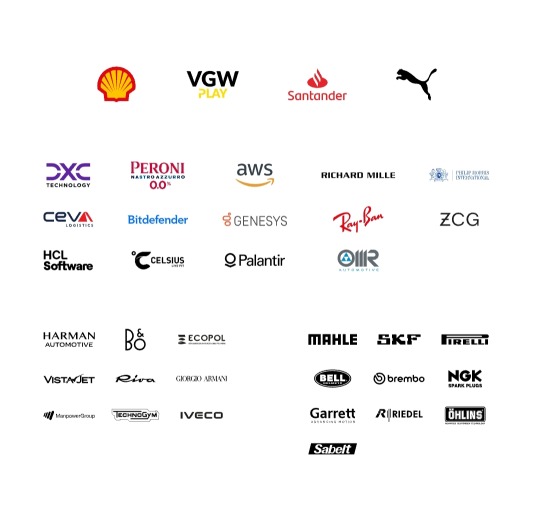
New sponsors: VGW Play (Australian tech game company, joined later in 2023), DXC Technology (American IT company, joined later in 2023), Peroni (Italian brewing company), Z Capital Group/ZCG (American private asset management/merchant bank company), Celsius (Swedish energy drink manufacturer) 2024 data last update: 2024/02/15
Old sponsors that left: Mission Winnow (American content lab by Phillip Morris International aka Marlboro), Estrella Garcia (Spanish alcoholic beverages manufacturer), Frecciarossa (Italian high speed train company) 2023 data last update: 2023/02/16
More: Mission Winnow is a part of Phillip Morris International. They are no longer listed as team sponsor but PMI is listed instead.
(starting here, 2023 data last update is 2023/02/23 and 2024 data last update is 2024/02/15)
McLaren F1 Team: (Only McLaren RACING's data is available idk if some of these are XE/FE team partners but anw..)
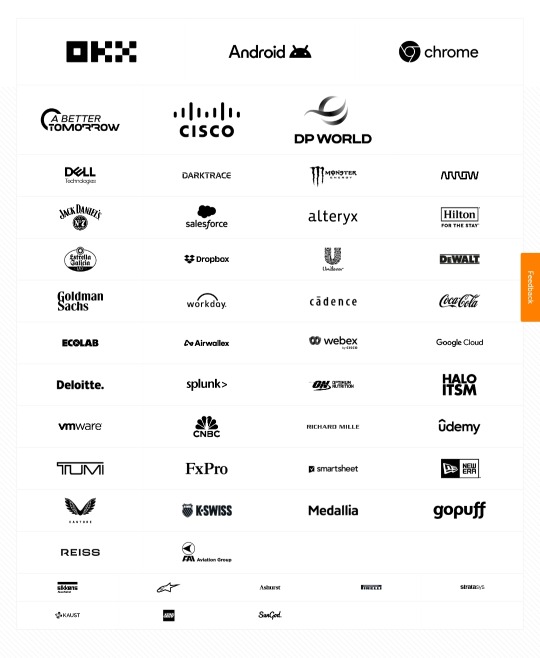
New sponsors: Monster Energy, Salesforce (American cloud based software company, joined later in 2023), Estrella Garcia (Spanish alcoholic beverages manufacturer), Dropbox (American file hosting company), Workday (American system software company, joined later in 2023), Ecolab (American water purification/hygiene company), Airwallex (Australian financial tech company), Optimum Nutrition (American nutritional supplement manufacturer), Halo ITSM (American software company, joined later in 2023), Udemy (American educational tech company, joined later in 2023), New Era (American cap manufacturer, joined in 2023), K-Swiss (American shoes manufacturer, joined later in 2023), Alpinestars (Italian motorsports safety equipment manufacturer)
Old sponsors that left: DP World (Emirati logistics company), EasyPost (American shipping API company), Immersive Labs (UK cybersecurity training company?), Logitech, Mind (UK mental health charity), PartyCasino (UK? online casino site), PartyPoker (American? gambling site), Sparco (Italian auto part & accessory manufacturer), Tezos (Switzerland crypto company)
Aston Martin Aramco F1 Team:
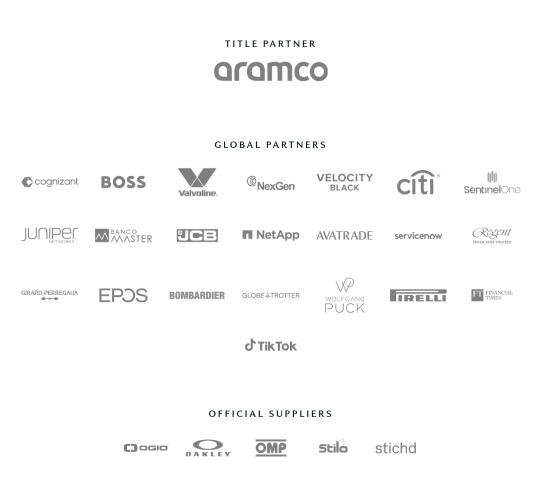
New sponsors: Valvoline (American retail automotives service company, joined later in 2023), NexGen (Canadian sustainable? fuel company), Banco Master (Brazilian digital banking platform, joined later in 2023), ServiceNow (American software company, joined later in 2023), Regent Seven Seas Cruise, Wolfgang Puck (Austrian-American chef and restaurant owner, joined later in 2023), Financial Times (British business newspaper), OMP (Italian racing safety equipment manufacturer), stichd (Netherlands fashion & apparel manufacturer)
Old sponsors that left: Alpinestars (Italian motorsports safety equipment manufacturer), crypto.com (Singaporean cryptocurrency company), ebb3 (UK? software company), Pelmark (UK fashion and apparel manufacturer), Peroni (Italian brewing company), Porto Seguro (Brazilian insurance company), Socios (Malta's blockchain-based platform), XP (Brazilian investment company)
Stake F1 Team (prev. Alfa Romeo):
???? Can't found their website (might be geoblocked in my country???)
BWT Alpine F1 Team:
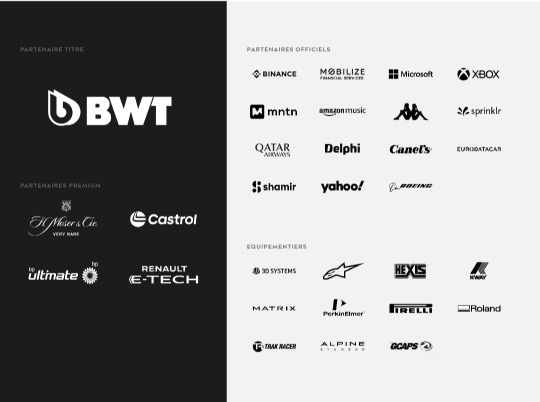
New sponsors: MNTN (American software company), H. Moser & Cie (Switzerland watch manufacturer), Amazon Music
Old sponsors that left: Bell & Ross (French watch company), Ecowatt (??? afaik French less-energy smthn smthn company), Elysium (French? American? Software company), KX (UK software company), Plug (American electrical equipment manufacturing company)
Visa CashApp RB F1 Team (prev. Scuderia Alpha Tauri):

New Sponsors: Visa, CashApp, Hugo Boss, Tudor, Neft Vodka (Austrian alcoholic beverages company), Piquadro (Italian luxury bag manufacturer)
Old sponsors that left: Buzz (?), Carl Friedrik (UK travel goods manufacturer), Flex Box (Hongkong? shipping containers manufacturer), GMG (Emirati global wellbeing company), RapidAPI (American API company)
Haas F1 Team:

New sponsors: New Era (American cap manufacturer, joined later in 2023)
Old sponsors that left: Hantec Markets (Hongkong capital markets company), OpenSea (American NFT/Crypto company)
Williams Racing:

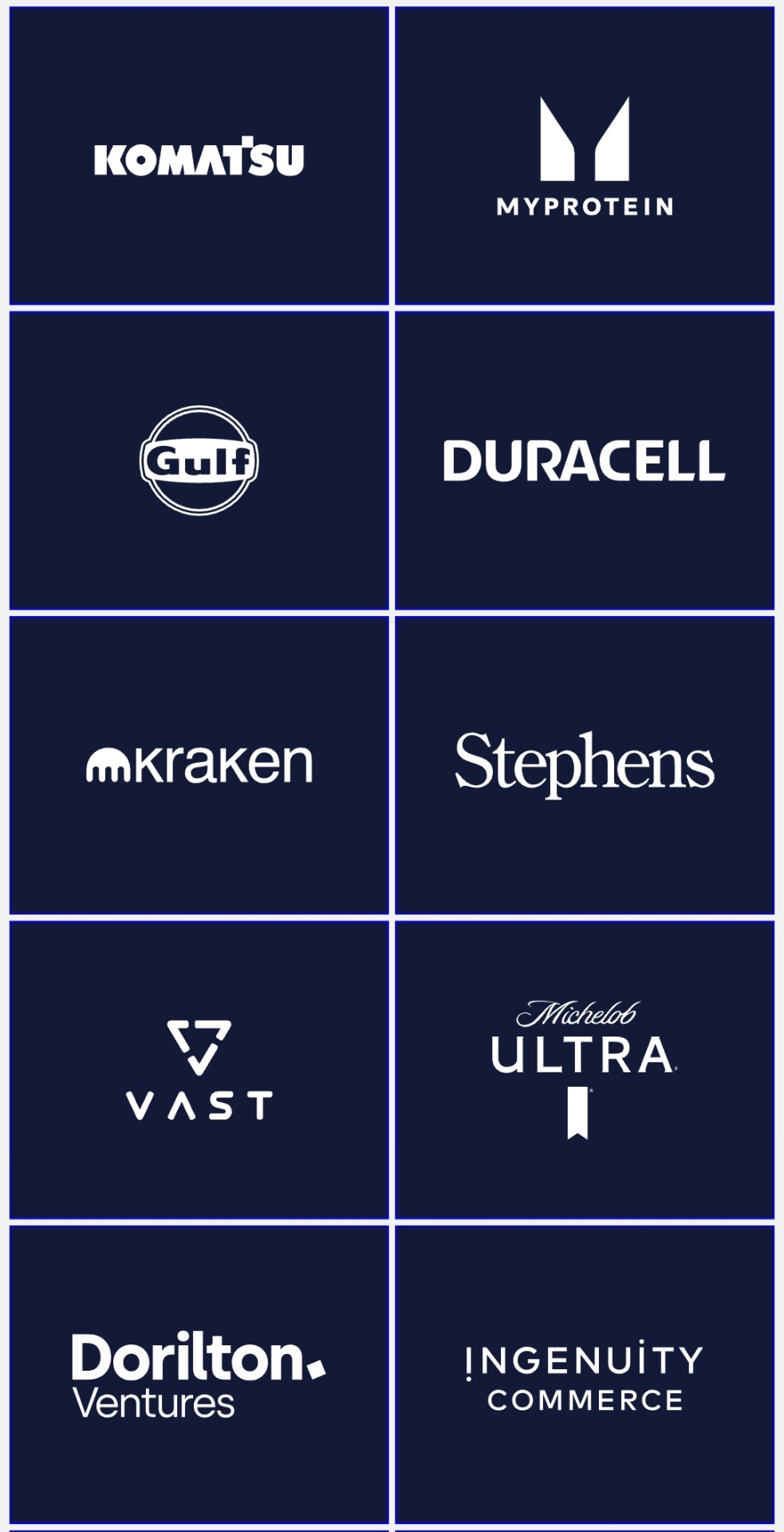
New sponsors: Komatsu, MyProtein (British bodybuilding supplement), Kraken (American crypto company, joined later in 2023), VAST Data (American tech company), Ingenuity Commerce (UK e-commerce platform), Puma (joined later in 2023)
Old sponsors that left: Acronis (Swiss software company), Bremont (British watch manufacturer), Dtex Systems (American? cybersecurity company), Financial Times (British business newspaper), Jumeirah Hotels & Resorts, KX (UK software company), OMP (Italian racing safety equipment manufacturer), PPG (American painting manufacturer), Umbro (English sports equipment manufacturer), Zeiss (German opticals/optometrics manufacturing company)
#mercedes amg petronas#red bull racing#scuderia ferrari#visa cash app rb#haas f1 team#mclaren f1#aston martin#alpine f1#williams racing#stake f1 team#f1#ari's rant#sponsor talks
41 notes
·
View notes
Text

From La Stampa (translated from Italian):
“Make Finance Great Again,” Trump family makes its own cryptocurrency and allies with Silicon Valley
It will be called “World Liberty Financial,” will have tech investors and real estate developers from Chase Herro and Zak Folkman to Steve Witkoff inside. Sons Eric and Donald Jr. will coordinate. And his backer Tyler Winklevoss jokes, “Donald has been orange-pilled, indoctrinated.”
Jacopo Iacoboni
Sept. 17, 2024
Updated 11:00 a.m.
3 minutes of reading
They want to do a kind of “make finance great again,” along the lines of MAGA, the election slogan and the Make America Great Again campaign. Donald Trump's sons, Don Jr. and Eric, of course with their father's imprimatur, are about to launch a new cryptocurrency platform that will be called “World Liberty Financial,” and will allow users to make even massive transactions without a bank getting in the way and extracting fees (and with a very low level of tax tracking, it should be added). A couple of concepts familiar to bitcoin fans, for example, but which the Trump family now has ambitions to decline on a large scale. It is not certain that this marriage between Trumpism and decentralized finance, DeFi, is a harbinger of only positive developments.
The board of “World Liberty Financial” will also consist of former crypto investors such as Chase Herro and Zak Folkman, and Steve Witkoff, a real estate developer and old friend of Trump. But thanks to documents filed with the U.S. Federal Election Commission that we have been able to read we know that in general the entire Trump campaign - Make America Great Again Inc. - received money not only from Musk, but cryptocurrency from billionaire twins Cameron and Tyler Winklevoss, who lead the cryptocurrency company Gemini: about $3.5 million in Bitcoin on July 19, the day after Trump's speech at the Milwaukee convention. The Winkelvosses also poured in money to America PAC, the tech investor-backed group that Musk helped launch in 2024 (Trump had bragged that Musk was giving him $45 million a month; Musk said his contribution is “at a much lower level”). Another co-founder of a cryptocurrency exchange, Jesse Powell, boss of Kraken, and venture capitalists Marc Andreessen and Ben Horowitz (who created a16z) who have invested billions of dollars in cryptocurrency startups, have also made endorsements and poured money into Trump.
In short, for the Trump family to embark on this big cryptocurrency project is a natural consequence of the fact that these are almost becoming a Republican asset in the campaign, and the “libertarian” wing of the old Gop is now a kind of very, very rampant ideologized “cyberlibertarianism.”
The real boss of the “tech bros” according to many is not Elon Musk, but Peter Thiel. Zuckerberg's longtime partner in Facebook, co-founder of PayPal, Thiel's fortune has at least doubled during the Trump presidency. Palantir-a much-discussed software company variously accused of extracting data from Americans and profiling them-has managed to get a contract from the Pentagon. Other donors to MAGA Inc include Jacob Halberg, Palantir's princely analyst, and Trish Duggan, a wealthy Scientology funder and friend of the tech bros.
Trump's vice presidential candidate, J. D. Vance, traveled to Silicon Valley and the Bay Area, celebrating a dinner at the home of BitGo CEO Mike Belshe, 100 people each pouring in between $3,300 a plate and a $25,000 roundtable. Trump in 2021 called bitcoin a “fraud against the dollar.” A few weeks ago, speaking in Nashvill at the bitcoin fan conference, he promised, “The United States will become the crypto capital of the planet.” Better than his friend Putin's Russia, although this Trump did not say so explicitly. The fact is that after his speech, Tyler Winklevoss ran on X (now the realm of cyberlibertarians) and joked that Donald had been “orange-pilled,” making a Matrix analogy, had been “indoctrinated,” or had finally seen the real reality behind the appearances.
3 notes
·
View notes
Text
Latest News: RBI Collabs With Tech Gaints
Crypto banks’ future is improvising day-by-day as traditional banks started showing in developing crypto banks!
Wanna know the latest update in the banking industry!
Keep going!
Central banks like RBI expressed their interest in collaborating with the Crypto Banking Service Provider to develop a blockchain-based financing project. By knowing this hot news, UK-based crypto banks announced that they are ready to join hands with India, to launch this project.

RBI collaborating with Blockchain-based Financing Project - Insights
RBI’s intention in developing a standard blockchain-powered Crypto Banking Project is strong, says reports. As an initial step of this project development they are ready to tie up with popular banks like SBI, ICICI, and HDFC, related to the issuing of digital documents and proof-of-concept.
Then takes a second step of collaborating with the tech giants like CordaTechnologies, IBM, and SettleMint. It’s a hardcore proof that Crypto’s are the future in ruling the banking sector.
Can I Create A Crypto Bank?
Of course you can!
But not on your own!
Hiring a developer is the most advised idea and the most recommended one too. Because Crypto Banks require lots of accuracies as you are dealing with funds and crypto’s. Any minute mistake can be a big threat in the future. Seeking support from the Crypto Banking Service Provider can actually save you and can make you to successful. Also, remember standing out from the crowd is a must as competitions are heavy.
Crypto Banking Solutions from a professional developer can actually make you exposed to N number of features like
Merchant Payment Gateway
Low Transactions Fees
Cryptocurrency Trading Desk
User Controlled Wallet
Instant Transactions
Protection For Banks From Frauds
Real-time Data Analysis
Remittance
Secure API
Intuitive Front-End
Banking Modules
Loans & Credit
Why not consider them?
Source: Medium
#digital banking#Crypto Bank#crypto banking#Crypto banking software#bank#investment#finance#crypto#Cryptocurrency
0 notes
Text
post-rave mixology
haunting grounds and liminal spaces are the setting of a new lecture on post-rave economics. the professor starts reciting AI-made poetry from the literature-nobel-winning bot, which operates without prompts and has only been fed rateyourmusic album review's and lyrics. the 87 human students and 32 post-human students all have different interpretations on the professor's lecture; all of which seem to perfectly operate on an hypothetical plane of immanence, only accessible through VR. And as they are turning in their final essay (which is written not in words, but geometric figures, arithmetic operations and emojis), a new synthetic crypto-currency just enters the market and sixteen minutes after its debut, it collapses and generates 17,000 micro-crisis on the cyber-space de-centralized banking system, and generates revenue for the big Capital software, which has operated as a computer virus withouth any intelligence or cognition being aware of it; as it grows, less and less Memory is available for users to install apps and common knowledge starts receding
2 notes
·
View notes
Text
Are you new to Crypto
Are you new to Crypto? Here is how to start !!
Cryptocurrencies have taken the world by storm, and it's not surprising that many people are now interested in investing in them. However, for someone new to the world of crypto, the idea of buying and selling digital assets can be intimidating. In this article, we'll provide a beginner's guide on how to get started with cryptocurrencies.
Step 1: Research
Before investing in cryptocurrencies, it's important to do your research. Cryptocurrencies are highly volatile and complex, so you need to understand the risks involved. Start by learning the basics of blockchain technology, which is the underlying technology that powers cryptocurrencies. You can find plenty of resources online, including videos, articles, and books, that can help you learn about these topics.
Step 2: Choose a cryptocurrency exchange
Once you have a good understanding of cryptocurrencies, it's time to choose an exchange. There are many exchanges available, and it's important to choose one that's reputable and secure. Look for an exchange that has a high level of security, offers a wide range of cryptocurrencies, and has a user-friendly interface. Some popular exchanges include Coinbase, Binance, and Kraken.
Step 3: Create an account and verify your identity
Once you've chosen an exchange, create an account and verify your identity. Most exchanges require you to provide personal information, such as your name, address, and ID. This is to comply with anti-money laundering (AML) and know your customer (KYC) regulations. It's important to note that the verification process can take some time, so be patient.
Step 4: Fund your account
After your account is verified, you can fund it with fiat currency or cryptocurrencies. Most exchanges accept bank transfers, debit/credit cards, and some even accept PayPal. Choose the payment method that's most convenient for you and follow the instructions provided by the exchange.
Step 5: Buy your first cryptocurrency
With your account funded, you can now buy your first cryptocurrency. Choose the cryptocurrency you want to buy and the amount you want to spend. Most exchanges will show you the current price of the cryptocurrency you're buying, as well as any fees associated with the transaction. Once you're ready, click the "buy" button and confirm the transaction.
Step 6: Store your cryptocurrency
After buying your cryptocurrency, it's important to store it in a secure wallet. A wallet is a software program that allows you to store, send, and receive cryptocurrencies. There are two types of wallets: hot wallets and cold wallets. Hot wallets are connected to the internet and are convenient for frequent trading, while cold wallets are offline and more secure for long-term storage. Some popular wallets include Ledger, Trezor, and MetaMask.
In conclusion, investing in cryptocurrencies can be a rewarding experience, but it's important to take the time to do your research and understand the risks involved. Choose a reputable exchange, fund your account, buy your first cryptocurrency, and store it in a secure wallet. With these steps, you'll be well on your way to becoming a successful crypto investor.
#crypto
#lauriesuarez
#lauriesuarez.com
#crypto101bylauriesuarez.com
1 note
·
View note
Photo

Website for a global non-governmental organization established by banking and financial institutions to provide governance, standards, and a commercialization framework for the issuance, distribution, and monetization of digital currencies. To find out more about how we can assist you, contact @titangenix today. . . . . . . . #crypto #bitcoin #cryptocurrency #blockchain #ethereum #webdesign #design #website #digitaltrends #agency #creative #business #entrepreneur #success #marketing #branding #marketingdigital #innovation #onlinemarketing #contentmarketing #marketingtips #marketingstrategy #startups #management #businesstips #software #B2B #instagramforbusiness #b2bmarketing #eventmarketing (at United States) https://www.instagram.com/p/CltTGPmNik5/?igshid=NGJjMDIxMWI=
#crypto#bitcoin#cryptocurrency#blockchain#ethereum#webdesign#design#website#digitaltrends#agency#creative#business#entrepreneur#success#marketing#branding#marketingdigital#innovation#onlinemarketing#contentmarketing#marketingtips#marketingstrategy#startups#management#businesstips#software#b2b#instagramforbusiness#b2bmarketing#eventmarketing
3 notes
·
View notes
Text
Top 5 Crypto Accounting Software Of 2024

Remember when you used to shake your piggy bank, counting every coin and feeling satisfied when it was full? Well, welcome to the modern-day version of that with Crypto Accounting Software—your digital piggy bank! This smart software not only keeps track of your crypto but also organizes everything for you, without the coin noise or stress. It’s like having an assistant who manages all your crypto finances, making sure everything’s perfectly in place.
Crypto Accounting Software is like your piggy bank growing up, earning a finance degree, and solving all your crypto accounting issues. It's like a magic tool for your digital assets! No more fussing over small details; it handles everything smoothly.
Just like in the movie "In Time", where time is the currency, Crypto Accounting Software is the ultimate timekeeper of your investments. Each crypto transaction, trade, and investment adds value, just like extending your time in the movie. With this software, you'll be able to track gains and losses and make smart financial moves to build your crypto wealth.
Now, let’s dive into the top five Crypto Accounting Software of 2024. These tools will make managing your crypto assets easier, from tracking portfolios to filing taxes.
Gilded: Simplifies crypto transaction management for businesses, offering automatic sync with accounting systems like QuickBooks and Xero.
Accointing: A go-to for crypto portfolio tracking and tax reporting, with support for over 300 wallets.
Bitwave: Perfect for businesses handling large transaction volumes and needing audit-ready reports.
CoinLedger: Specializes in crypto tax calculations, offering an easy way to integrate past transaction data.
SoftLedger: Provides real-time insights into multi-currency crypto transactions and simplifies financial reporting.
Crypto accounting is becoming essential, and these tools are your key to handling it all like a pro. Happy tracking!
0 notes
Text
Cheap Crypto Mining Software: Top 5 Options Under $100
As the world of cryptocurrency continues to expand, more people are looking to get involved in mining without breaking the bank. Fortunately, there are several affordable crypto mining software options available for under $100 that can help both beginners and experienced miners. Here are the top five choices that you might consider:
CGMiner
CGMiner is one of the most popular and long-standing mining software options available. It is open-source and offers compatibility with various hardware, including FPGA and ASIC miners. CGMiner provides real-time statistics, remote management, and a user-friendly interface. While it does require some technical knowledge to set up, the performance it delivers makes it worth the effort, especially for those looking to maximize their mining potential.
EasyMiner
If you’re looking for a more user-friendly option, EasyMiner is a great choice. This software offers a graphical user interface that simplifies the mining process, making it accessible for beginners. It supports both CPU and GPU mining and has a built-in wallet for easy management of your earnings. EasyMiner is free to use, but donations are encouraged to support further development.
BFGMiner
BFGMiner is another powerful mining software tailored specifically for FPGA and ASIC mining. It comes with various features, including fan control, CPU mining, and detailed statistics. The software also supports stratum mining pools, which can enhance your mining efficiency. Although BFGMiner is not as beginner-friendly as EasyMiner, it is a robust option for those willing to invest some time in learning how to use it effectively.
NiceHash Miner
NiceHash Miner provides an excellent platform for users who want to get started with crypto mining without a significant upfront investment. The software automatically selects the most profitable algorithms for your hardware, maximizing your earnings. It also features an intuitive interface that is easy to navigate, making it a great choice for both beginners and experienced miners. The software is free to download, but transaction fees may apply.
MultiMiner
MultiMiner is designed to make mining as simple as possible. This software provides a graphical interface and supports various mining hardware types. It automatically detects available mining devices and presents a list of the most profitable coins to mine. MultiMiner is free to use and is an excellent choice for anyone looking to streamline their mining process without spending a lot of money.
Cheap Mining Rigs: Top 5 Options Under $500
Cheap Crypto Mining Software: Top 5 Options Under $100 For those looking to enter the world of cryptocurrency mining, acquiring affordable mining rigs is essential. Here are five options under $500 that can help you kickstart your mining journey:
Antminer S7
The Antminer S7 is a well-known ASIC miner that delivers solid performance at a relatively low price point. It’s capable of mining Bitcoin and offers a hash rate of around 4.73 TH/s. Although it may require some tweaking to optimize its performance, it is an excellent choice for anyone looking to mine Bitcoin on a budget.
Bitmain Antminer L3+
Designed for mining Litecoin and other Scrypt coins, the Bitmain Antminer L3+ is an affordable option that boasts a hash rate of approximately 504 MH/s. This rig is known for its reliability and efficiency, making it a popular choice among Litecoin miners.
Innosilicon A2 Miner
The Innosilicon A2 Miner is an ASIC miner that is suitable for Scrypt mining. With a hash rate of about 24 MH/s, it is an economical option for those interested in mining cryptocurrencies like Litecoin. Its low power consumption makes it an attractive choice for miners looking to keep their electricity costs down.
Raspberry Pi Mining Rig
For those who prefer a DIY approach, creating a mining rig using a Raspberry Pi can be a cost-effective solution. While it won’t deliver the same hash rates as dedicated mining hardware, it can be an educational experience for beginners. By pairing it with USB miners, you can build a rig for under $500 and start mining smaller cryptocurrencies Cheap Mining Rigs: Top 5 Options Under $500.
USB Bitcoin Miners
If you’re looking for an affordable way to enter the mining scene, USB Bitcoin miners are a great option. These devices are compact and easy to use, allowing you to mine Bitcoin with minimal setup. While they may not produce high hash rates, they can be a fun and low-cost way to start mining at home.
New Crypto Scams in 2025
As the cryptocurrency market grows, so does the number of scams targeting unsuspecting investors. Here are seven new crypto scams that have emerged in 2025:
Fake ICOs
Initial Coin Offerings (ICOs) continue to attract scammers looking to exploit naive investors. In 2025, a surge in fake ICOs has been reported, often promising unrealistic returns. Always research the team behind an ICO and their previous projects before investing.
Ponzi Schemes
Ponzi schemes remain a prevalent threat in the crypto space. 7 New Crypto Scams in 2025, new platforms are emerging that promise high returns for little effort. These schemes often collapse when new investors stop joining, leaving earlier investors with losses.
Phishing Attacks
Phishing attacks targeting crypto wallets have become increasingly sophisticated. Scammers create fake websites that mimic legitimate exchanges to steal users’ credentials. Always ensure you’re on the official site before entering sensitive information.
Pump-and-Dump Schemes
Pump-and-dump schemes involve artificially inflating a cryptocurrency's price through misleading promotions. Once the price is pumped up, the scammers sell off their holdings, leaving unsuspecting investors with worthless coins. Be wary of social media hype around certain coins.
DeFi Scams
Decentralized Finance (DeFi) has attracted scammers looking to exploit the lack of regulation. In 2025, several DeFi platforms have been reported to operate without proper security measures, resulting in significant losses for investors.
Clone Exchanges
Clone exchanges are fake cryptocurrency exchanges that replicate the layout of legitimate platforms. Scammers lure users to deposit funds, only to vanish with the money. Always verify the exchange's reputation before trading.
Rug Pulls
Rug pulls involve developers abandoning a project after raising funds from investors. In 2025, new tokens have emerged that promise high returns but lack transparency. Conduct thorough research before investing in new tokens.
By staying informed about these scams, investors can better protect themselves and their investments in the rapidly evolving world of cryptocurrency.
1 note
·
View note